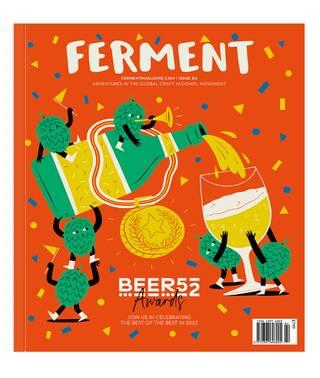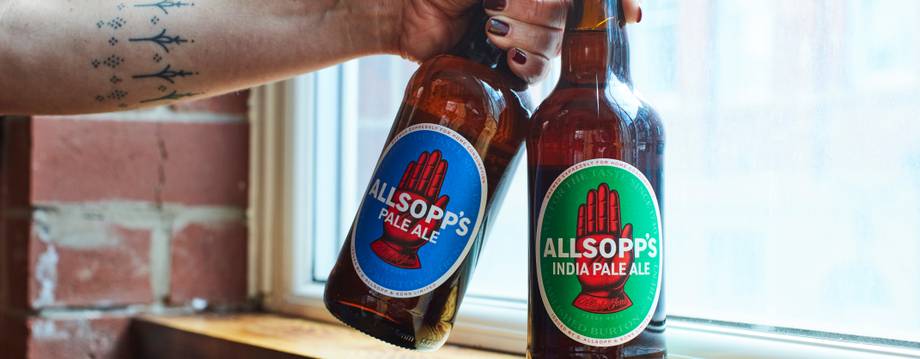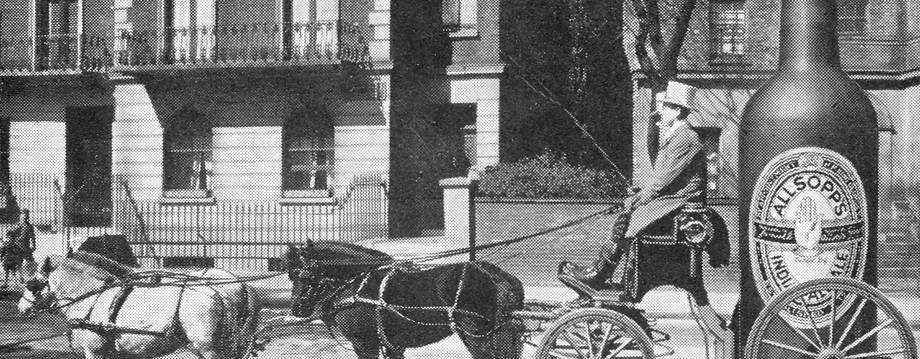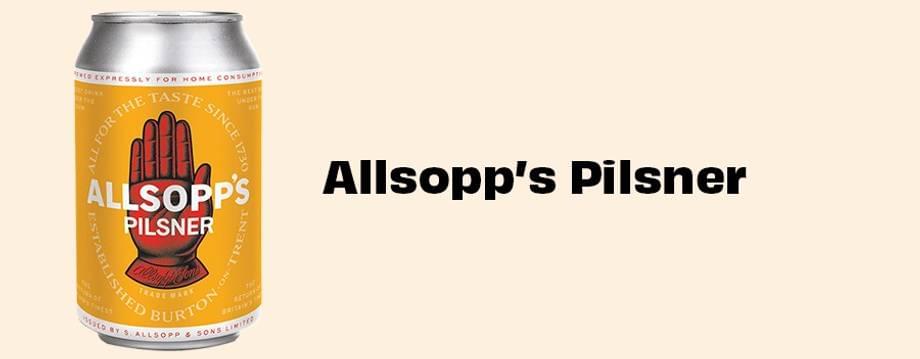Allsopp's
• • • Heritage Award • • •
Pete Brown
Saturday 22 October 2022

This article is from
Beer52 Awards 2022
issue 84
Share this article
Pete Brown shares his journey into the dramatic past and exciting future of one of the UK's most important brewing names
Very few people who change the world realise that’s what they’re doing at the time. Sometimes it can take decades, even centuries, for their impact to finally land.
When Samuel Allsopp changed the world of beer, he was desperate. He was rolling the dice one final time to keep his business afloat, and wouldn’t know whether or not his impulsive action had saved his livelihood until around twelve months later.
In the late 18th century, Allsopp had grown a successful brewing business by selling strong, sweet Burton ales to Europe, particularly to the Russian Imperial Court (legend has it that Catherine the Great was a huge fan, and could outdrink any male courtier). But as Napoleon Bonaparte took hold of Europe, he blockaded its ports, strangling Allsopp’s routes to market. The brewery looked finished.
Then, the world’s most powerful corporation came to his rescue. Campbell Marjoribanks of the English East India company knew that Allsopp brewed beers suited to long periods of travel. He presented a sample of a London-brewed pale ale and asked Allsopp if he could recreate it. Allsopp’s head brewer, Job Goodhead, said that he could but, just after spitting it out, asked why the hell anyone would want him to. Marjoribanks explained that the beer was brewed by Hodgson’s of London, especially for the East India Company’s employees stationed in India. It was by far India’s most popular beer, but Hodgson was getting greedy. He needed to be taught a lesson. Would Allsopp brew a beer to rival him?

What none of the people in that room knew was that the same beer brewed with Burton spring water would turn out much better than when it was brewed in London. Decades later, by which time Burton was the most important brewing town on the planet, its scientists would work out that the town’s hard water was unbeatable for hoppy pale ales (which is why ale brewers ‘Burtonise’ their water to this day). On 27th December 1822, two ships sailed from Liverpool for Calcutta, carrying Allsopp’s pale ale as well as Hodgson’s. Six months later, the first ship, the Bencoolen, managed to sell Allsopp’s beer for a little less than the market leading brand. But on the second ship, the Seaforth, the cargo of Hodgson’s beer had spoiled, and Allsopp’s became a hit. Six months after that, the ships returned to Liverpool, carrying orders and letters of praise back to Burton. Within a few years, Allsopp’s dominated the trade in what was becoming known, back home in Britain, as ‘India Pale Ale’, shortened later to IPA.
The story of how Allsopp’s Burton-brewed IPA and, later, that from rival Burton brewer Bass, is well known among beer historians. Less famous is “the beer that finished us off,” as Samuel Allsopp’s seven-times-great-grandson, Jamie, styles it.
In the 1890s, Percy Allsopp, Samuel’s grandson and new Chairman of the brewery, decided that IPA was over and that lager was the future (not unreasonably, perhaps – by the middle of the decade, Becks was a far more popular beer in India than any IPA). After studying in Germany, Percy had engineers in New York custom-build him a state-of-the-art lager brewery and ship it to Burton. It went into production in 1899, and was a spectacular failure. Percy resigned and was declared bankrupt in 1914. By 1920, the Allsopp family had been ousted from the business, which limped on until it merged with Ind Coope in 1935.

That wasn’t quite the end of the story for the Allsopp’s lager brewery though. In 1921 it was moved to Alloa. Scotland adopted lager earlier than England, and Graham’s Golden Lager from Alloa became Graham’s Skol, and in 1959, just Skol. This descendant of Allsopp’s lager was one of the biggest-selling beer brands of the 1970s, and one of the beers that finally turned Britain – fifty years after Percy’s death – into a nation of lager drinkers.
From the distance of a hundred years, Jamie Allsopp can laugh about the loss of his family business now. But he never, ever quite accepted it.
“I was about eight years old when I had the idea to bring the brewery back,” he says. “All around the house there were jugs and mirrors decorated with Allsopp’s logos. Everyone in the family talked about the brewing business, but I didn’t really understand it. I wrote to brewers asking if they had anything else connected to the brewery. And when Carlsberg [the eventual inheritors of the Allsopp’s trademark] wrote back with some old beer labels, I was hooked.”
Jamie Allsopp has collected Allsopp’s memorabilia ever since. Slowly, this became more than a hobby. He began tracking down the ownership of Allsopp’s trademarks, which had become scattered and lost by endless acquisitions and mergers. My book, Hops & Glory, fills in some of the gaps in the story. When Jamie succeeded in reclaiming all the Allsopp’s trademarks, he quit his job in finance and relaunched Samuel Allsopp & Sons as a going concern.

“The last turning point was the ledger,” he says. “Steve Holt of Kirkstall Brewing somehow had a ledger full of old Allsopp’s brewing recipes, which he very kindly shared with us. We knew we had to have an authentic IPA, and also a more sessionable pale ale, so we launched with those two beers – adjusted for modern times and modern ingredients, but faithful to the idea of what they were.”
For the third beer in the range, it is perhaps tempting fate to go straight in with a recreation of “the beer that finished us off”. But it’s also typical of Jamie’s combination of business sense and laconic humour. Allsopp’s Pilsner bears no resemblance to Skol: three parts authentic Czech pilsner mixed with one part world lager, it’s accessible enough for the mainstream lager drinker, but interesting enough for craft fans.
As we approach the 200-year anniversary of the first shipment of Allsopp’s IPA to Calcutta, a barrel-aged IPA very similar to it is in the works. And then there’s the legendary Arctic ale…
“We have loads more recipes in the ledger,” says Jamie. “I’d just like to restore Allsopp’s to its position as a large family brewer of quality British beers.”
Based on the first three beers, the smart money is more towards a repeat of Samuel’s timely success rather than Percy’s grand folly.
Share this article

